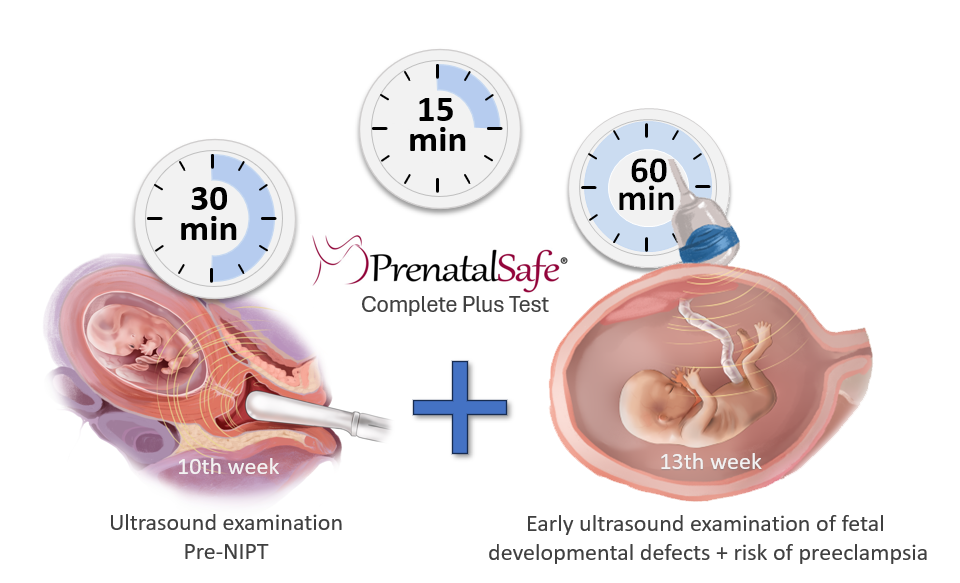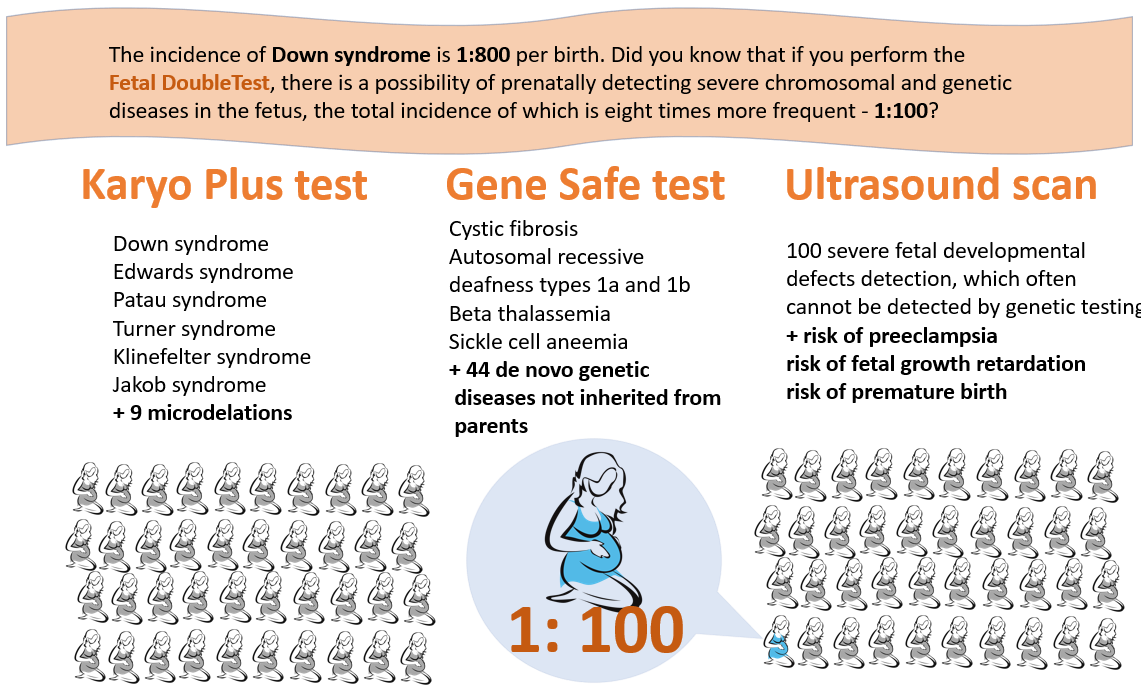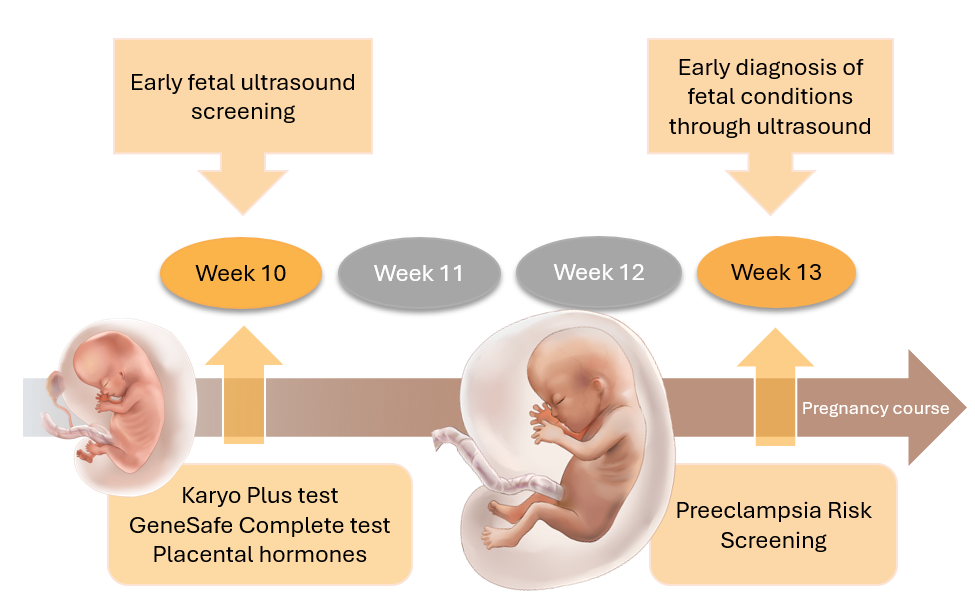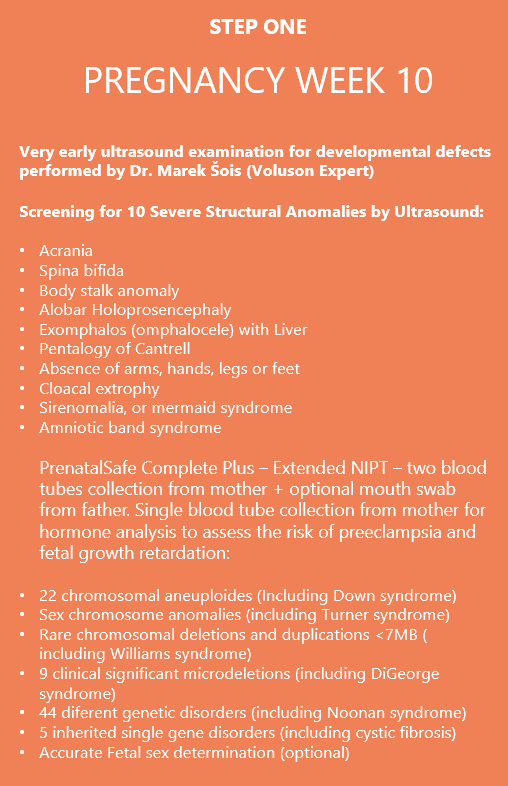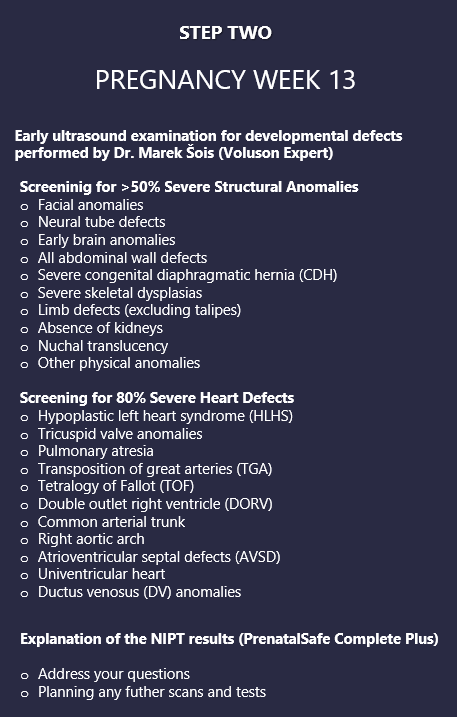The Fetal Ultrasound Center started to offer a new modern combined screening test for the first trimester - the Fetal Double test
The Fetal Ultrasound Center has the ability to detect rare diseases in the fetus prenatally.
In Europe, a rare disease is considered a disease that occurs in less than one person in two thousand. In total, more than 10,000 rare diseases have been described in the world. The incidence of these diseases is 3.5 -5.9% of the population. In Estonia, there may be 47,000 -80,000 people with rare diseases. Almost 80% of rare diseases are of genetic origin. Therefore, every fifth rare disease would remain undetected prenatally without the use of ultrasound. The Fetal Ultrasound Center offers the Fetal DoubleTest for prenatal detection of rare diseases.
The Fetal Double test is an innovative and modern first trimester combined screening. It combines the strengths of two different non-invasive fetal extracellular DNA tests with the advantages of two high-tech ultrasound examinations of the fetus at different stages of development. After performing the Fetal Double Test, a woman's residual risk of chromosomal and genetic disease is only 0.2% (1:500).
Fetal Double test, a very early ultrasound examination of fetal developmental defects together with KaryoPlus and GeneSafe Complete test at the 10th week of pregnancy and the combination of these studies with early detailed ultrasound diagnosis of the fetus and assessment of maternal risks during gestation at the 13th week of pregnancy, is currently one of the most accurate combined prenatal screening tests for the early detection of chromosomal and gene diseases and congenital developmental defects in children.
-
The Fetal Double test consists of the following separate studies:
- The purpose of very early ultrasound examination of fetal developmental defects is, firstly, to specify the size of the pregnancy and to assess the presence of a twin pregnancy and its type, and, secondly, to exclude situations where a NIPT test should not be performed. Since it is impossible to detect structural developmental defects in a child with the NIPT test, the purpose of a very early ultrasound examination of developmental defects in the fetus is to exclude 10 severe congenital developmental defects in the child.
- The PrenatalSafe Karyo Plus test enables the detection of other chromosomal numerical and structural pathologies and 9 clinically significant microdeletions in the mother's venous blood, in addition to Down, Edwards, and Patau syndrome, as well as the sex chromosome pathologies, all of which significantly affect the child's health.
- With the GeneSafe Complete test, it is possible to obtain information about the pathology of 29 different fetal single genes, which can cause 44 different de novo and 5 hereditary genetic diseases that are not very often detected by ultrasound examination and often manifest themselves only in the late period of pregnancy or in the first years of life.
- Early detailed fetal ultrasound with early echocardiography at the 13th week of pregnancy provides an opportunity to detect up to 100 different congenital developmental defects in the fetus. The ultrasound examination also measures the blood flow indices in the woman's uterine arteries and the length of the cervix, on the basis of which it is possible to assess the possibility of preeclampsia, intrauterine growth retardation and premature birth during a given pregnancy.
- The purpose of very early ultrasound examination of fetal developmental defects is, firstly, to specify the size of the pregnancy and to assess the presence of a twin pregnancy and its type, and, secondly, to exclude situations where a NIPT test should not be performed. Since it is impossible to detect structural developmental defects in a child with the NIPT test, the purpose of a very early ultrasound examination of developmental defects in the fetus is to exclude 10 severe congenital developmental defects in the child.
This combined screening helps to early detect nearly 100 different severe chromosomal or gene diseases and congenital developmental defects in the fetus that would otherwise remain undetected before birth or would only be detected later in pregnancy.
-
The Fetal Double test can detect the diseases listed below:
- Aneuploidy of chromosome 22 (including Down syndrome)
- Sex chromosome anomalies (including Turner syndrome)
- Rare chromosome deletions and duplications <7Mb (including Williams syndrome)
- 9 clinically significant microdeletions (including DiGeorge syndrome)
- 44 different genetic diseases (including Noonan syndrome)
- 5 hereditary monogenic diseases (including cystic fibrosis)
- Major severe congenital developmental defects (including spina bifida)
- Major severe heart defects (including transposition of large arteries)
In addition to detecting the pathology of the fetus, the Fetal Double test also provides an opportunity to find those women who may develop the following serious complications during pregnancy:
- Preeclampsia, in which the woman's kidney and liver function is disrupted, protein enters the urine and develops high blood pressure, which in more severe cases may be accompanied by a life-threatening seizure syndrome.
- Intrauterine growth retardation of the fetus, where the child does not reach its potential growth and lags in growth behind its peers. Due to a lack of food and oxygen, the gynecologist must monitor the growth and well-being of these fetuses with ultrasound more often and, if necessary, induce childbirth prematurely if the child's condition worsens.
- Premature birth due to a change in the structure of the cervix, as a result of which the cervix opens unnoticed during pregnancy, and the baby is born prematurely, when it is not yet able to cope with breathing outside the womb, maintaining the temperature and sucking on its own.
The Fetal Double test is the best choice for parents who want to get as much information as possible about pregnancy risks and their yet-unborn child
The Fetal Double test consists of two steps:
- Step ONE: Pre-NIPT ultrasound scan and blood test for PrenatalSafe Complete Plus test (PrenatalSafe Karyo Plus test + GeneSafe Complete test) and hormone analysis (PAPP-A) with pregnancy history and measurement of arterial blood pressure, weight and height at the 10th week of pregnancy. In addition to the mother's venous blood analysis, the test also requires an analysis of the child's father's oral mucosa.
- Step TWO: Early diagnostic ultrasound examination of developmental defects in the fetus at the 13th week of pregnancy and immediately after this explanation of the results of the Fetal Double test, answering questions and, if necessary, giving recommendations for a pregnancy management plan.
It is important to emphasize that if the GeneSafe test requires additional in-depth analysis from the laboratory, the turnaround time for receiving the test results may be extended beyond the previously promised 7-10 days. In this case, the result of the GeneSafe test will not be available by the day of the ultrasound examination but will be sent encrypted to the patient's email as soon as the test result arrives at the laboratory, along with explanations from the doctor.
- Combined screening is carried out for those whose pregnancy has lasted at least 10 full weeks (10 weeks + 0 days). If you would like to know the duration of your pregnancy, please visit our pregnancy calculator.
- With the combined test, you can also find out the gender of the fetus if desired. We offer the Fetal Double test only for singleton pregnancies.
- If the blood test is given at the 10th week of pregnancy, then the written response of the combined screening will be known to the woman immediately after the ultrasound examination at the 13th week of pregnancy.
It is essential to emphasize that the Fetal Double test does not replace the diagnostic ultrasound examination of fetal developmental defects performed at the 20th week of pregnancy because it is impossible to detect all developmental defects during the first trimester of pregnancy ultrasound examination. Likewise, the tests for chromosome and genetic diseases included in the Fetal Double test do not replace the need for amniocentesis if a congenital developmental defect is detected in the fetus during the second-trimester ultrasound examination.

